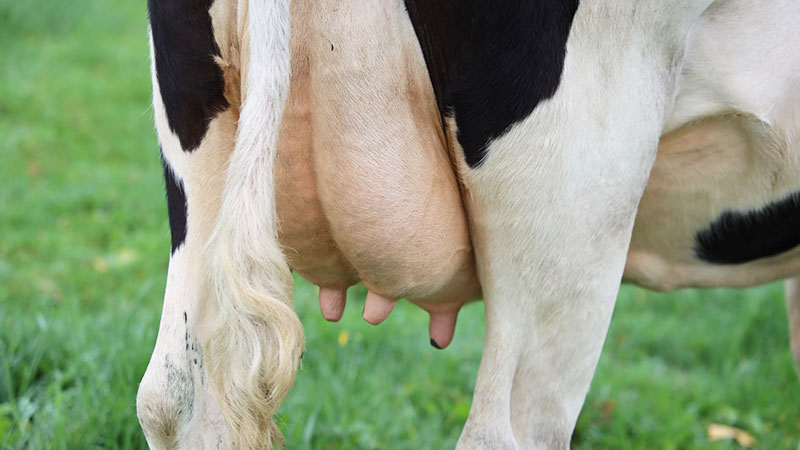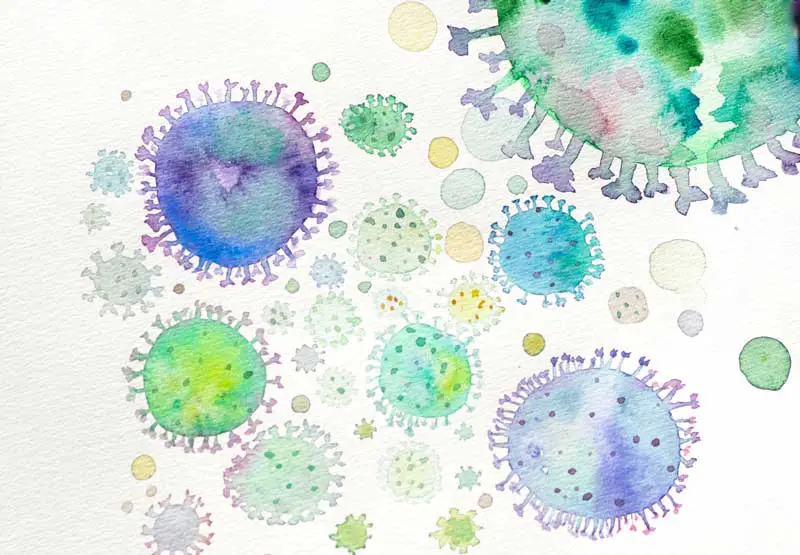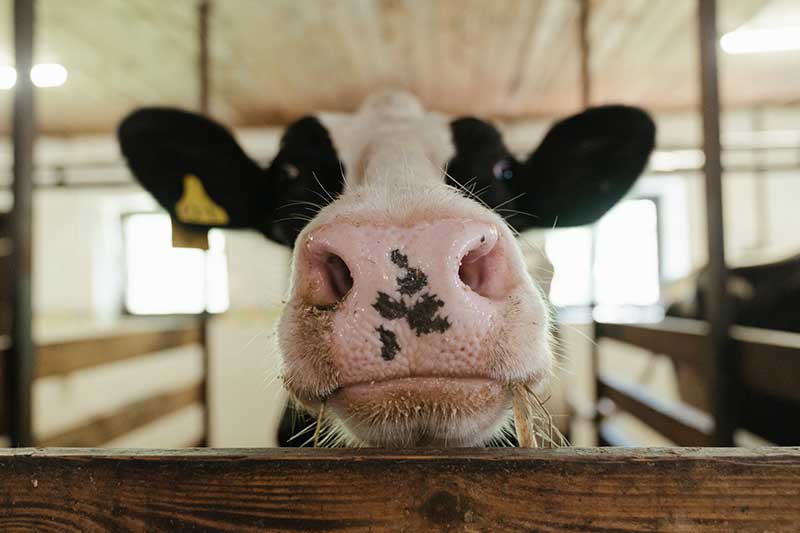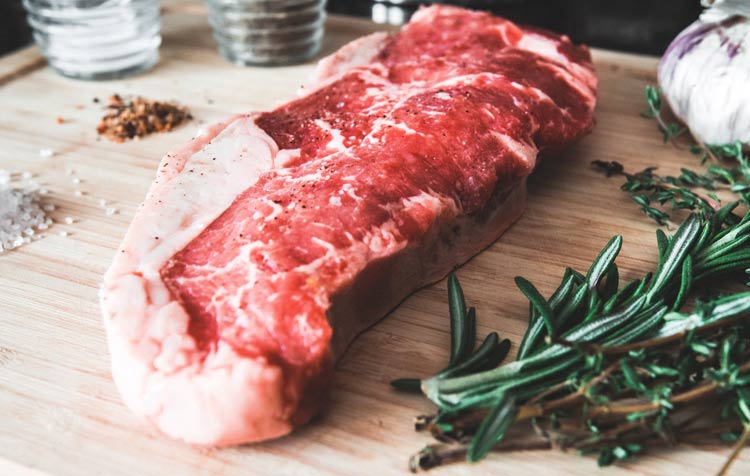Want to know what harmful substances are in meat, eggs and dairy products? Then you've come to the right place! The industry has done an incredible marketing job: Meat contains iron and makes you strong, eggs give us protein and milk is an important source of calcium. It would be bad if the consumption of animal foods did not have some good side. But those responsible are extremely reluctant to talk about the unhealthy and questionable ingredients.
In this article, I would therefore like to introduce you to exactly those ingredients of animal products such as meat, eggs and dairy products that you should definitely know before you go to the supermarket next time.
In advance you will find here a short Overview about the article:
- Antibiotics
- Antidepressants
- Feces
- Pus
- Blood
- Anti-inflammatories
- Pesticides & Herbicides
- Hormones
- Cholesterol
- Trans fats
- Germs
- Preservatives
- Saturated fatty acids
- Beta-blocker
- Animal proteins
- Heavy metals
- Dioxin
Notice: This article is not a substitute for medical advice, but merely provides information about ingredients and residues of concern in animal foods.
17 contaminants in animal foods that make you think
Let's not get it wrong: residues of concern have already been detected in plant-based foods as well. However, the Swiss Federal Office has found that approx. 92 percent of all ingredients in animal foods that are hazardous to health are located.₁ These include not only substances that are occasionally found in meat, milk and eggs, but also those that are always and also exclusively found in them.
We cannot see these toxins. That's why we like to gullibly underestimate the short- and long-term danger that comes from them. And it is precisely for this reason that it is important to deal with them. Here, I'm going to introduce you to 17 harmful substances in meat and other foods that have led me to stop eating animal products for health reasons.
1. antibiotics
50 percent of antibiotics in Germany are used for farm animals.₂ Around 735 tons of antibiotics are fed to animals in factory farming, which we later eat. Therefore, it is not particularly surprising that in an exemplary Investigation in Bavarian trade drug residues were detected in every second sample of beef.
2. antidepressants
Being separated from their offspring is extremely difficult for mother cows to bear. But also all other animals in the Factory farming suffer from extreme, mental stress. That is why they are given antidepressants. The residues can then be detected in meat, milk, cheese and eggs.
However, the active ingredients do not only enter the body cells of the animals via oral administration. Also for fish from rivers and lakes traces of the antidepressants have already been detected because the waste from factory farming ends up in the groundwater or is flushed directly into the waterways.₃
3. feces
For every liter of cow's milk, there are about 3 liters of Liquid manure.₄ No wonder, then, that other pollutants in animal products include feces! Even though it is fortunately filtered out mechanically for the most part, one finds in every liter of milk also traces from him. Pretty disgusting, don't you think?
4. pus

Nowadays, cows are high-performance machines! Accordingly, it also often comes to Inflammation of their udders. This is also the reason why basically not a single liter of cow's milk is free of pus cells.
5. blood
If feces and pus are among the contaminants in dairy products, then it's not much of a surprise that animal blood also seamlessly joins this list. A list of questionable ingredients that can be found in avoid in principle through a plant-based diet let
6. antiphlogistics
Contaminants in meat and other animal foods include. anti-inflammatory preparationswhich are mainly used to alleviate respiratory diseases and fever in factory farming. These anti-inflammatories are detected now and then in meat products.₅
7. PESTICIDES & HERBICIDES
Nowadays, crop protection products are used in agriculture to protect food from pests and diseases before and after harvest. However, these are not only essential for the species extinction responsible - their residues also accumulate in animal foods an. This is because cows, pigs, chickens and other animals eat feed contaminated with pesticides and herbicides.₆
8. hormones
It is not permitted to use hormones in European animal breeding. Depending on the legal situation, corresponding preparations can be used in the worldwide production of meat, milk, eggs or cheese, which is then exported to Germany. If this is the case, as a rule, for example, natural Sex hormones and steroids used to improve the feed conversion of animals and make the production process more efficient. Residues in meat and dairy products have already been detected more often. Incidentally, here again not only via direct administration, but also through Residues in water and groundwater.₇
9. cholesterol
Cholesterol is found exclusively in meat, eggs and dairy products such as cheese and yogurt. They are the reason why doctors often advise people to lower their own cholesterol levels. Cholesterol can be increasingly released from the blood in the blood vessel walls of our Arteries and clog them. However, true carnivores, such as lions, do not suffer from clogged arteries. Another indication that we Humans not carnivores are.₈
Our body produces cholesterol itself. That is quite enough! If we take it in from outside, it is automatically bad for us.
10. trans fats
Trans fats are formed during the industrial hardening of oils and the heating and frying of unsaturated fatty acids. They influence the Blood values and the cholesterol level more negatively than any other fat₉ - but in Germany there are as yet no limit values for the proportion of trans fats in food. They are mainly found in industrial finished products, such as frozen chicken and fish filletsbut in also Croissants before. Removing trans fats from your diet plan, by the way, is good advice if you want to reduce your Minimize risk for heart disease want.
11. bacteria & viruses

Want to learn about other contaminants in meat, milk, eggs and other animal foods? No problem. Continue with Pathogens and germs. Bacteria find very good conditions for their multiplication in raw foods such as meat and eggs. The problem: you usually can't tell if the food is infested with them. Only if they are contaminated with toxins, this manifests itself when you vomit a short time after a meal or you get diarrhea. Salmonella, E.coli, Campylobacter or Listeria are certainly among our best-known bacteria in animal products.₁₀
12. preservatives
Not all preservatives in food are bad - but some are concerning. Sodium nitrite is used, for example, to preserve cured bacon or foie gras. Such nitrites can cause poisoning in our body and hinders the transport of oxygen in the blood.₁₁
13. saturated fatty acids
Saturated fatty acids are mostly a component of animal foods such as sausage, cheese, butter and cream. They slow down our metabolism because they are deposited on cell membranes. In addition, they often lead to higher levels of inflammation and thus promote, for example, the Risk of high blood pressure, obesity, excessive cholesterol level and Heart attacks. If you are vegan dietyou can automatically eliminate about 95 percent of the saturated fat in your diet!₁₂
14. beta blocker
In the brutal dairy industry and generally in factory farming, animals are also Antihypertensive administered. Residues end up in groundwater and water bodies, which is why they are definitely detectable in foods such as fish.₁₃
When a doctor prescribes beta-receptor blockers to a patient, he usually does so to lower his blood pressure or the beating rate of his heart. They are intended for patients suffering from chronic heart failure or coronary heart disease.₁₄ If you are in good health, you should of course avoid these medications. And even more so if you suffer from conditions like asthma or slowed heart rate.
15. animal proteins
An increasing number of studies suggest that animal proteins with a increased risk for cardiovascular disease Large quantities of animal proteins, for example, lead to calcium loss.₁₆ The intake of animal proteins makes our blood more acidic. Our body has to neutralize it with phosphate, which is why our bones are attacked.₁₇ This is not the case with plant proteins, however.
16. heavy metals
Yes, also heavy metals like Mercury, lead and Cadmium are regularly detected in meat and especially marine products (e.g. in mussels, fish, shrimp or squid). In some cases, the contamination levels even exceed the maximum values.₁₈ The metals enter the environment and the cells of animals through the natural leaching of rocks, but especially through the industrial activities of humans. Especially the toxic mercury can cause nerve damage in us humans. Especially for babies and small children, exposure to the heavy metal can be very dangerous.₁₉
17. dioxin
The pollutants in animal foods are joined by dioxins, which, even in small amounts, are considered to be carcinogenic and highly toxic are. They accumulate in human fatty tissue and therefore also pose a long-term risk to one's own health.₂₀ We ingest between 90 and 95 percent of dioxins through our food. Due to the metabolism of chickens, for example, it quickly passes from the feed into the eggs. It is also deposited in the meat of factory farmed animals, but not quite as quickly. The toxic dioxin has a half-life of about seven years in human body fat - and therefore degrades only very slowly.₂₁
Specifically avoid pollutants in meat & co, stay healthy and leave the animals in peace

Of course, you can also get sick from smoking, excessive stress and other things. But since we can decide what to eat about three times a day, diet probably plays the biggest role in our health. Today you have learned about harmful substances in meat, milk, cheese, eggs and other animal foods. I hope this will help you provoke reflection could.
It is not only the Suffering of the animalswhich is completely superfluous. In my opinion, it is also simply unbelievably disgusting to learn what ingredients are in our food. With the switch to a balanced, vegetarian diet you are very likely to do without all these toxins.
Do you have questions or can you think of other harmful substances of concern that are found in animal products? Then just write me a comment.
Stay healthy,

PS.: Learn now, why i live vegan. So much in advance: my health is only one of three major reasons. Have fun!
References:
₁ A. Azzouz, B. Jurado-Sánchez, B. Souhail, et al. (2011): Simultaneous Determination of 20 Pharmacologically Active Substances in Cow's Milk, Goat's Milk, and Human Breast Milk by Gas Chromatography-Mass Spectrometry, https://t1p.de/c36g. [29.04.2021].
₂ Things Explained - In Brief: Meat - The World's Tastiest Evil, YouTube, Jan. 24, 2019, web, Apr. 29, 2021 at 10:21 a.m., in: https://www.youtube.com/watch?v=y6f3dwxexZM.
₃ University at Buffalo (2017): Antidepressants now in fish, https://t1p.de/jdsn. [29.04.2021].
₄ PETA Deutschland e.V.: (2018): Liquid manure pollutes drinking water and increases water costs (as of February 2018), available at https://www.peta.de/guelle. [29.04.2021].
₅ H. Tardel: Information on residue analysis, https://t1p.de/8pak. [29.04.2021].
₆ Thomas Göllner; Bayerisches Landesamt für Gesundheit und Lebensmittelsicherheit: Rückstände von Pflanzenschutzmitteln in Lebensmitteln tierischer Herkunft (Status: 07.08.2019), https://t1p.de/jtb1
₇ R-Biopharm AG: Hormones and Anabolic Steroids, https://t1p.de/m4e8. [29.04.2021].
₈ Monks - Ärzte im Netz GmbH: Too high cholesterol levels lead to arteriosclerosis: https://www.cholesterinspiegel.de/hoher-cholesterinspiegel-die-folgen. [29.04.2021].
₉ A. Goesch: These foods contain dangerous trans fats (as of 18.11.2018), https://www.t-online.de/gesundheit/ernaehrung/id_75455812/transfette-diese-lebensmittel-enthalten-killerfette-.html
₁₀ German Medical Association and National Association of Statutory Health Insurance Physicians: Physician warns of pathogens in beef and dairy products (as of Feb. 26, 2019), https://t1p.de/ofkh. [29.04.2021].
₁₁ J. Menner: Preservatives: these are worrisome (as of May 26, 2019), https://utopia.de/ratgeber/konservierungsstoffe-diese-sind-bedenklich. [29.04.2021].
₁₂,₁₇ Gary Yourofsky: Gary Yourofsky - The Most Important Speech You Will Ever Hear, YouTube, Feb 06, 2015, web, Apr 29, 2021 at 10:58 AM, in: http://y2u.be/U5hGQDLprA8.
₁₃ Umweltbundesamt: Arzneimittelwirkstoffe in der Umwelt (Stand: 09.11.2020), https://t1p.de/mnkg. [29.04.2021].
₁₄ T. Eschenhagen (2019): Beta-blockers: effects, side effects and interactions, https://t1p.de/m3qs. [29.04.2021].
₁₅ M. Tertilt: Is animal protein really better? (Accessed 04 Nov. 2019), https://www.quarks.de/gesundheit/ernaehrung/ist-tierisches-eiweiss-wirklich-besser. [29.04.2021].
₁₆ Elisabeth Warzecha; Die Gesellschaft für Ernährungsmedizin und Diätetik e.V (2006): Osteoporose - Die Sicht der Ernährungsberatung, https://www.karger.com/Article/Pdf/282052 [29.04.2021].
₁₈ Nds. Landesamt für Verbraucherschutz und Lebensmittelsicherheit: Schwermetalle in Fischen und Fischereierzeugnissen, https://t1p.de/aj1r. [29.04.2021].
₁₉ PETA Deutschland e.V.: Mikroplastik, Quecksilber und Würmer: So ungesund ist Fisch (Stand: 14.04.2021), https://www.petazwei.de/fisch-ungesund. [29.04.2021].
₂₀ State of Berlin; kra/dpa: Dioxin - What is it and why is it so dangerous? (as of: 20.07.2012), https://t1p.de/0tis. [29.04.2021].
₂₁ Federal Environment Agency: Dioxins (as of 31.08.2017), https://www.umweltbundesamt.de/themen/chemikalien/dioxine. [29.04.2021].





